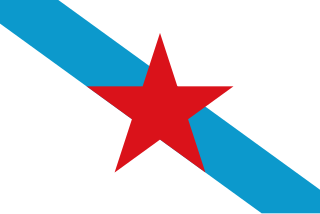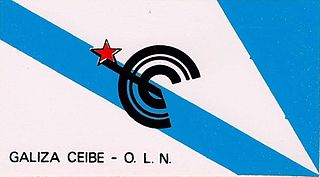
In Spain, an autonomous community is the first sub-national level of political and administrative division, created in accordance with the Spanish Constitution of 1978, with the aim of guaranteeing limited autonomy of the nationalities and regions that make up Spain.

The Galician Nationalist Bloc is a political party from Galicia, formed with the merger of a series of left-wing Galician nationalist parties. It is self-defined as a "patriotic front".

Alfonso Daniel Manuel Rodríguez Castelao, commonly known as Castelao, was a Galician politician, writer, painter and doctor. He is one of the fathers of Galician nationalism, promoting Galician identity and culture, and was one of the main names behind the cultural movement Xeración Nós. He was also one of the founders and president of the Galicianist Party and had a great influence on the renovating group of Galician art known as Os renovadores. Castelao is considered to be the most important figure in Galician culture of the 20th century.
Galician Workers' Party was a political party in Galicia, Spain.

The Partido Galeguista was a Galician party founded in 1978, referring to itself as the historical descendant of the Partido Galeguista in the Second Spanish Republic (1931-1939).

Galician nationalism is a form of nationalism found mostly in Galicia, which asserts that Galicians are a nation and that promotes the cultural unity of Galicians. The political movement referred to as modern Galician nationalism was born at the beginning of the twentieth century from the idea of Galicianism.

Terra Galega is a coalition of centrist and Galician nationalist political parties; it was established on November 4, 2005; but the name has been registered since May 2005.

The Statute of Autonomy of Galicia of 1936 was a statute of autonomy for Galicia. It was voted in referendum and presented to the Spanish Parliament. Yet, it could never be implemented because of the Spanish Civil War (1936–1939) and subsequent Francoist Spain (1939–1977). The 1936 statute was drafted by the Partido Galeguista, and it is the historical precedent of the current Statute of Autonomy of Galicia of 1981.
The Partido Galeguista was a Galician nationalist party founded in December 1931. It achieved notoriety during the time of the Spanish Second Republic. The PG grouped a number of historical Galician intellectuals, and was fundamental in the elaboration of the Galician Statute of Autonomy.

Internationalist Initiative–Solidarity among Peoples (II–SP) was a radical left political coalition from Spain.

Renewal–Nationalist Brotherhood is a political party in Galicia. Formed in 2012, under the guidance of historical leader Xosé Manuel Beiras, Anova was formed by Encontro Irmandiño, the FPG, Movemento pola Base, the Galician Workers Front, and independents. Anova defines itself as a Galician nationalist, socialist, feminist, ecologist, internationalist organization and advocates for Galician independence. Its internal organization is run by assemblies.

Galiza Ceibe-OLN was an independentist and socialist political party in Galicia, Spain. Galiza Ceibe was founded on 1980 by the Galician Party of the Proletariat as a political and electoral front, originally to present a list in Vigo and in other galician municipalities under the name Agrupación Electoral Galicia Ceibe in the 1979 local elections.

The National Inter-Union of the Galician Workers was a Galician union with an anticapitalist, leftist and Galician nationalist ideology, direct heir of the Intersindical Nacional Galega (ING), and precursor of Confederación Intersindical Galega (CIG).

The Galician National-Popular Bloc was a Galician electoral candidacy. It had as the national sovereignty for Galiza as its main objective and as an alternative to autonomism. It was formed by the Galician People's Union (UPG) and Galician National-Popular Assembly (ANPG).

The Galician Socialist Party–Galician Left was a Galician nationalist and left-wing party of Galiza.

The Galician Socialist Party was a socialist and Galician nationalist political party active in Galicia.

Commitment to Galicia is a Galician political party with a Galician nationalist, progressive ideology.

The Galician Nationalist Party–Galicianist Party was a Galician nationalist and liberal political party, coming from a split of the Galician Coalition. The PNG–PG had 132 members in 2002. Xosé Mosquera Casero was the last secretary general, after the VIII Congress in September 2011. The party merged with Commitment to Galicia in 2012.

The Communist Party of the Galician People is a Galician political organization with a communist and independentist ideology founded in 1984.
Galician Unity was a Galician nationalist and democratic socialist party formed by the Galician Socialist Party-Galician Left (PSG-EG) in 1991.
















